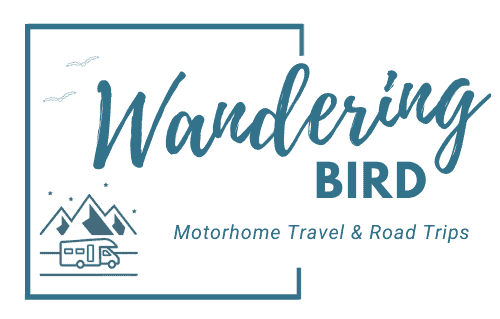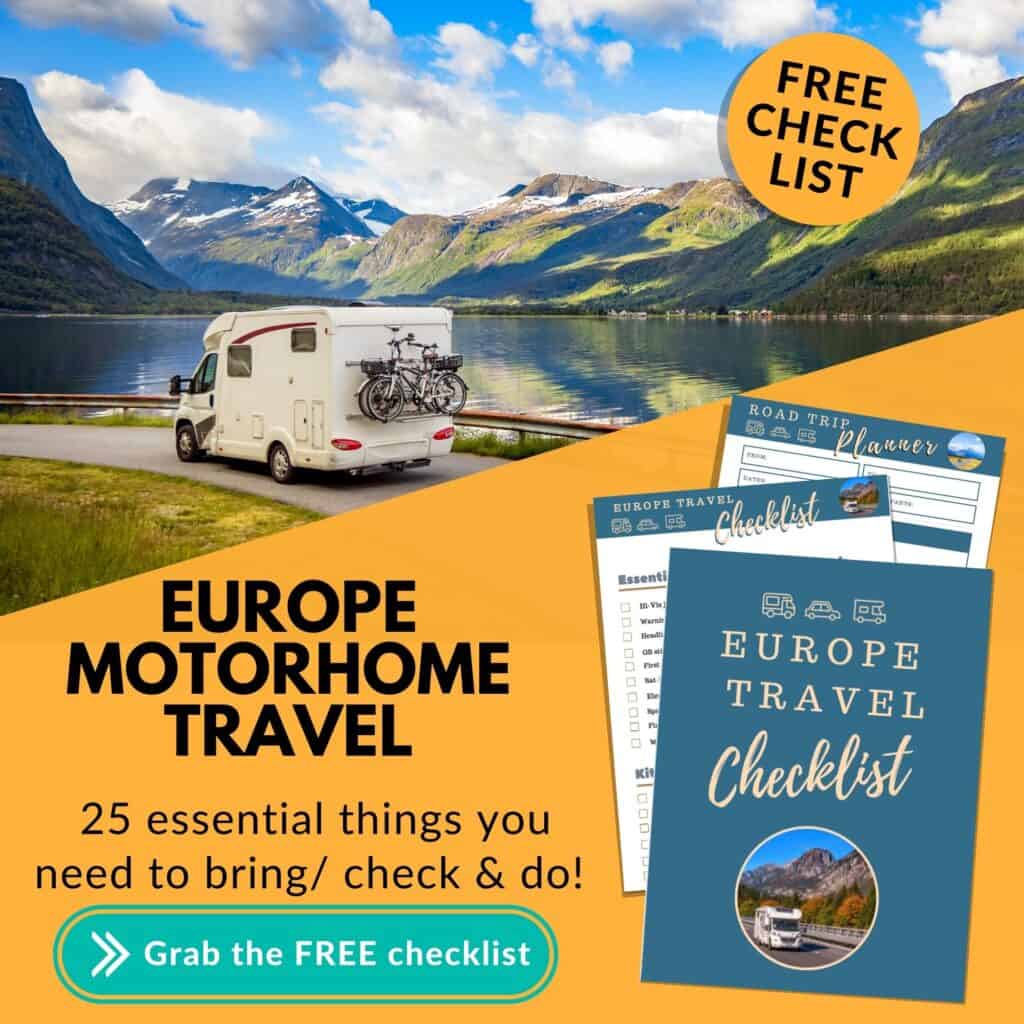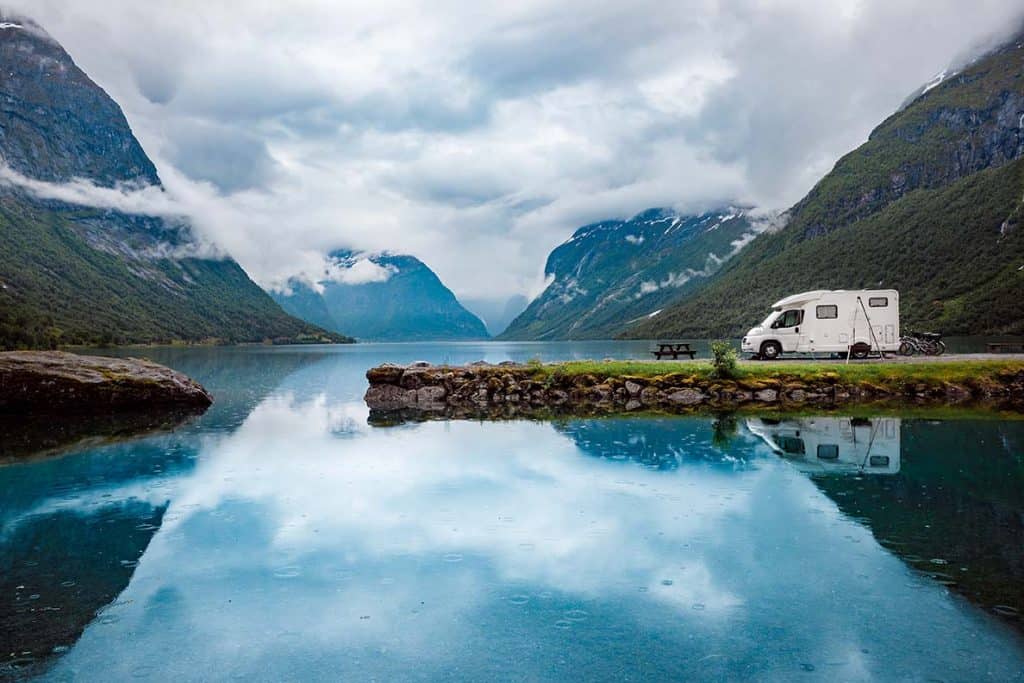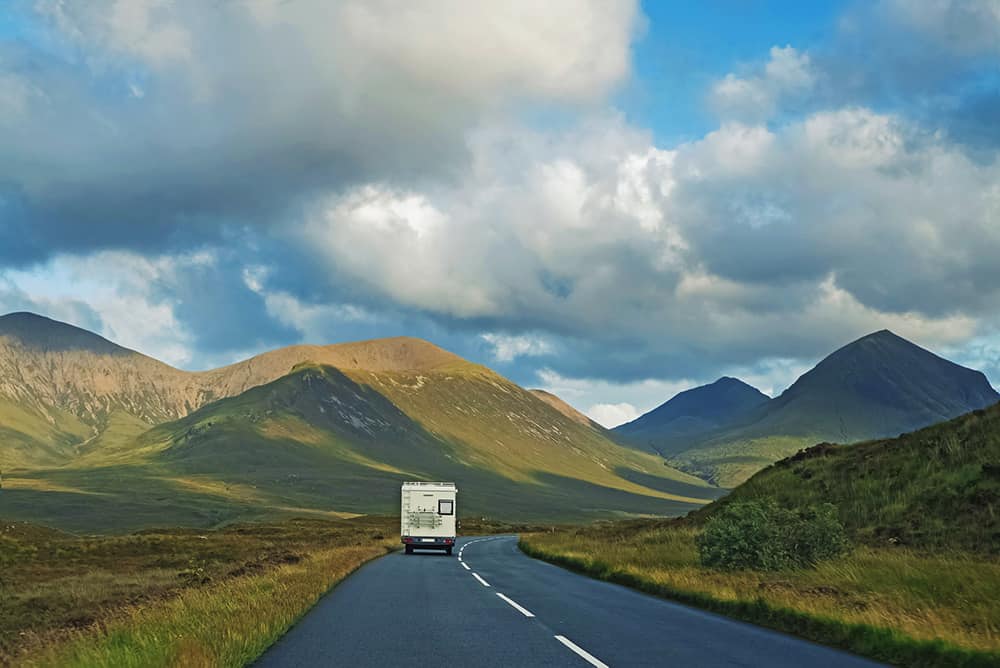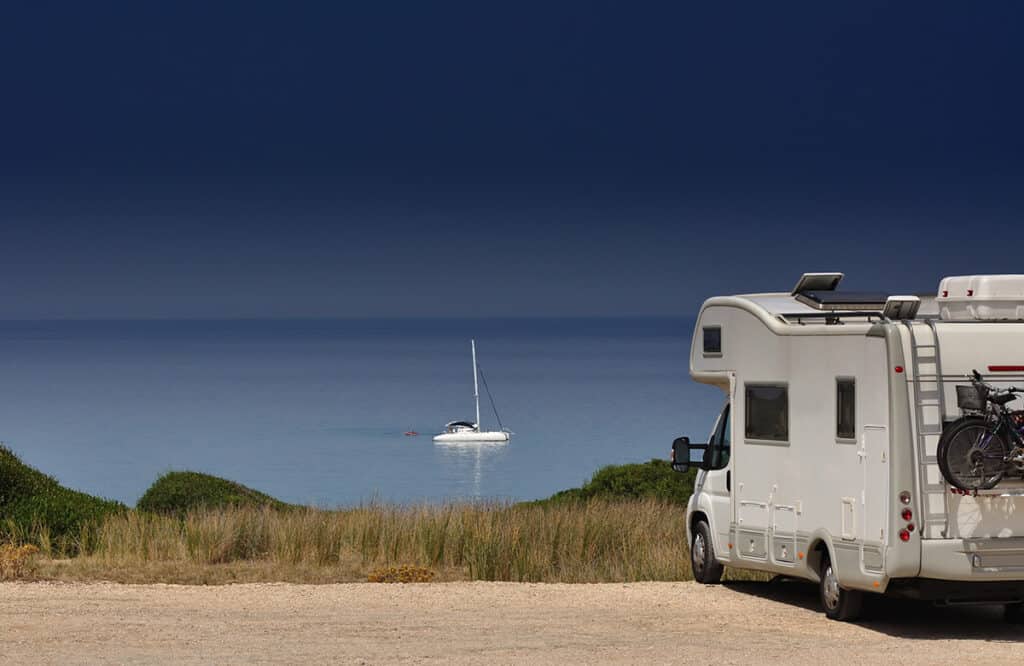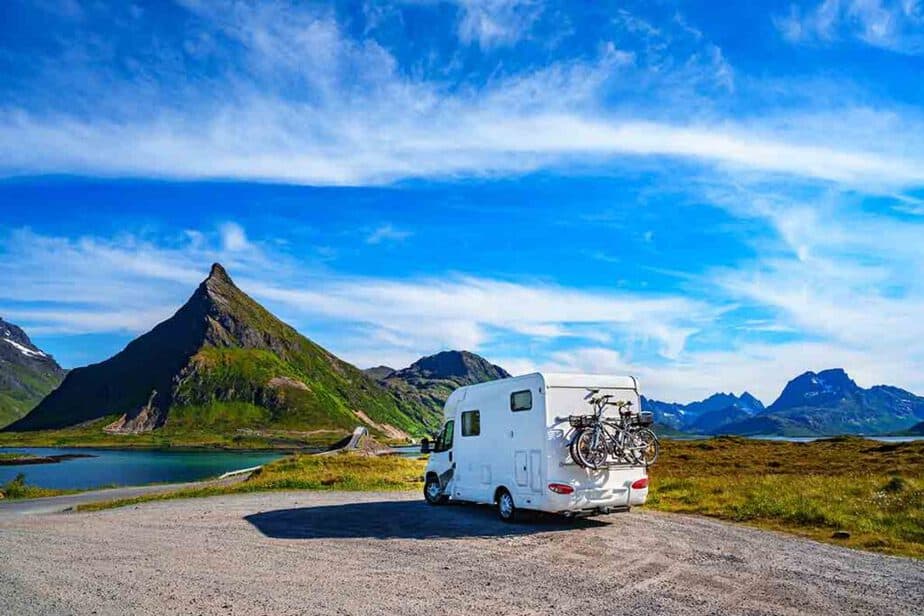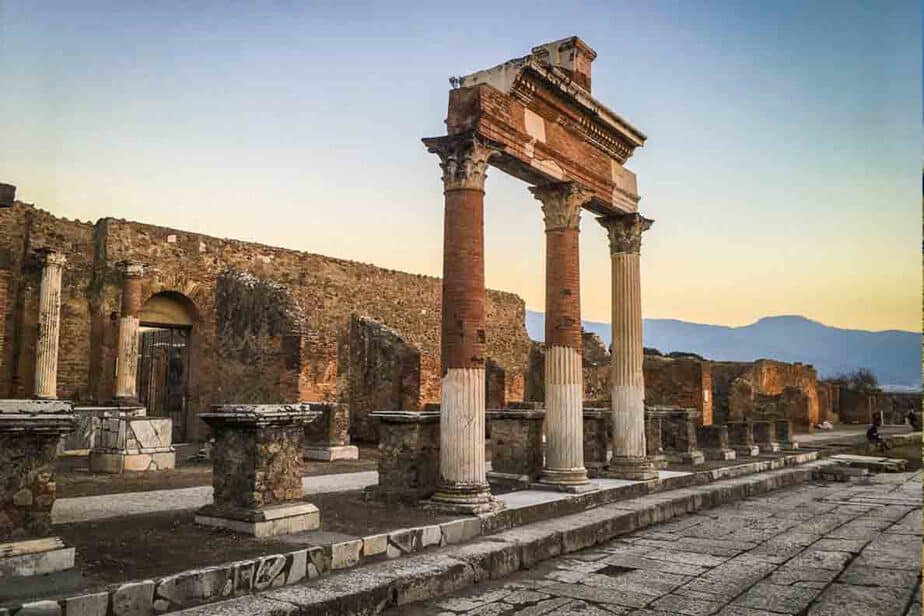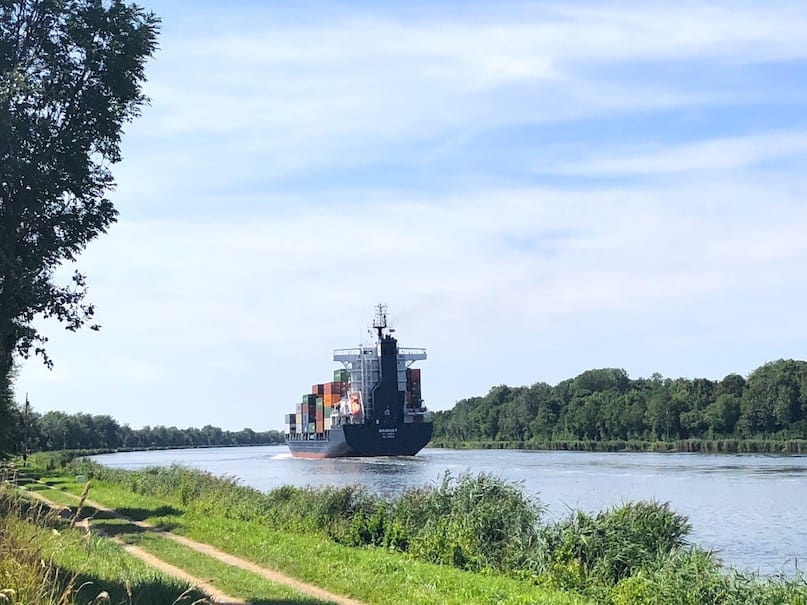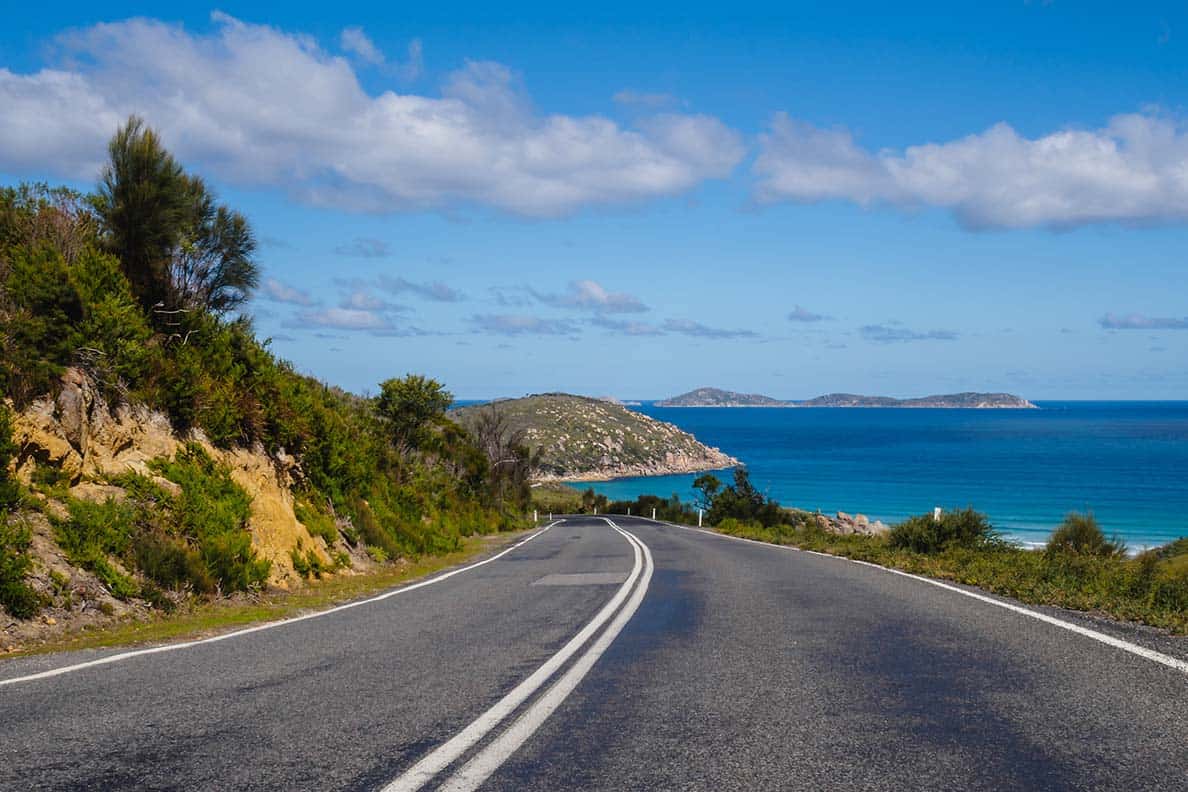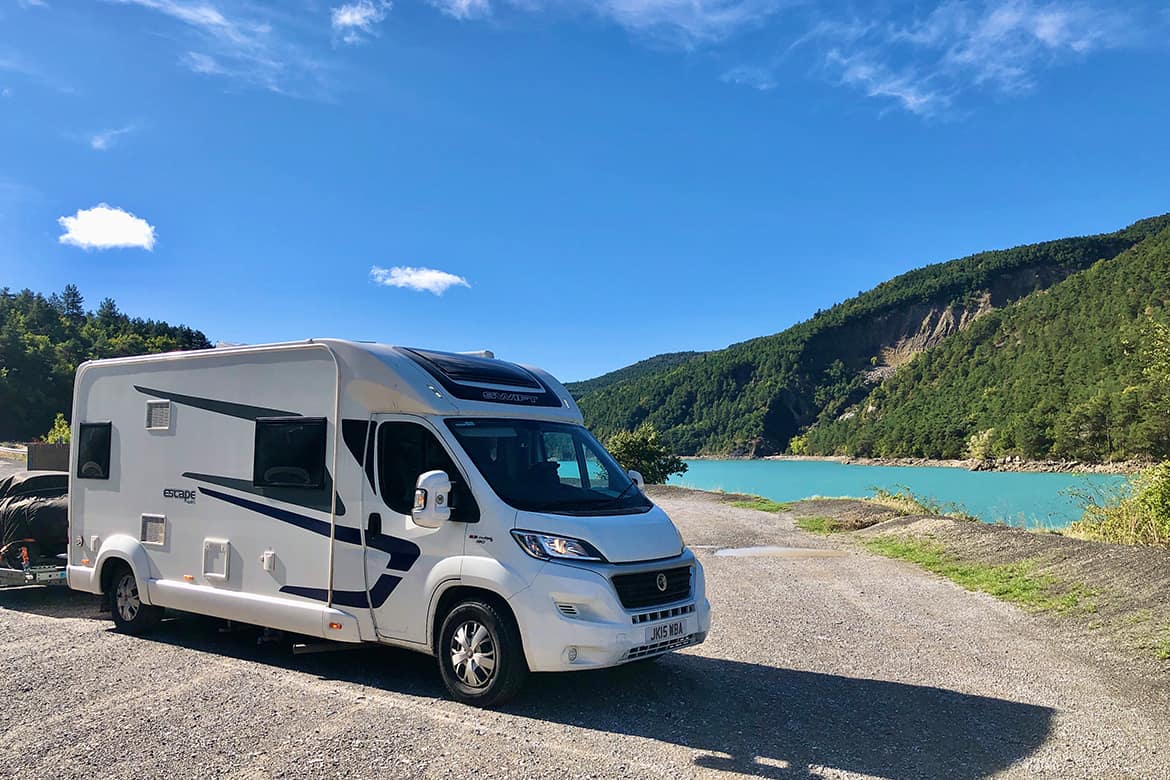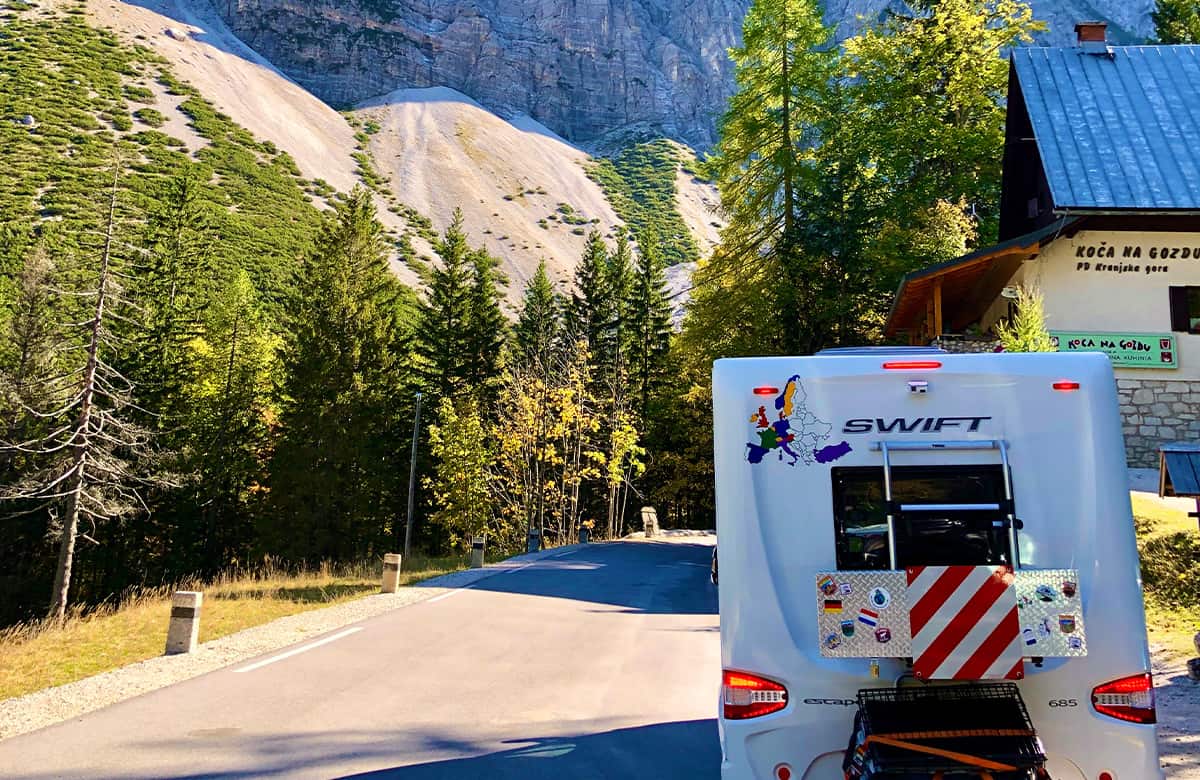Motorhoming & Campervanning in Germany- The Ultimate Guide

Planning a motorhome or campervan trip to Germany? Want to see some of the most incredible places in Europe? Here’s everything you need to know to go campervanning or motorhoming in Germany, including routes and places to visit.
Don’t forget to download your FREE Europe motorhome travel checklist below to help you plan your Germany road trip.
*We work hard to make this the best motorhome travel blog and road trip website possible, full of helpful content for you. The website is supported by our readers, so if you buy through links on this site we may earn a commission- at no extra cost to you. All opinions remain our own.
If you find this post useful, you can also treat us to a coffee – we promise to enjoy it while creating more useful content like this- we might even indulge in a biscuit (or two!)
JUMP AHEAD TO...
Motorhoming in Germany – why you should go!
I’ll be honest- I didn’t want to visit Germany with our motorhome. I don’t know if it was due to growing up watching Fawlty Towers and ‘don’t mention the war’, or just the fact that they kept beating us at football, but it was looooooow on my places to go.
But, alas, it’s not just me in the motorhome and occasionally I have to allow my husband a chance to go where he wants to. He spent a lot of time as a child in Germany (members of his family were stationed there) and he loves the country. So I sulkily set a course on the motorhome sat-nav and off we went.
And I LOVED it.
Motorhoming in Germany- highlights
It’s now one of my all-time favourite countries. The history is mind-boggling, the people are friendly and the castles. Oh my goodness, the castles are out of this world.
Plus there’s yummy food, roads without speed limits (I’ll admit, more use on a motorbike rather than a motorhome), beer halls (which are terrific fun) AND there are toboggan runs- I’m officially addicted. Suffice it to say, we’ve been back to Germany several times and there’s not been anywhere in the country I’ve not enjoyed.
Germans love their wohnmobils (motorhomes in German) and provide plenty of parking and overnight stopovers for them. There are around 1500 Stellplätzen around the country- and that’s not including campsites or other approved stopovers.
In this post, we’re going to share with you everything you need to know to go motorhoming or campervanning in Germany, including getting to Germany and planning your route, where to stay (motorhome campsites, sostas or wild camping with your camper), some road trip itineraries and places to visit, driving tips and other practical advice to help you have an amazing German road trip.
If this is your first campervanning trip to Germany (or Europe!), don’t forget to grab your free motorhome travel checklist which will help you plan and organise everything you need.
Planning to take your motorhome to Europe?
GUIDE: Stop the overwhelm with our step-by-step guide. Contains eBook, checklists and more. Complete Europe Motorhome Travel Toolkit
CHECKLIST: Don’t forget to grab your FREE Europe motorhome travel checklist HERE
GEAR– If you need any motorhome gear for touring Europe, here’s what we recommend.
Campervanning in Germany- where to go
When planning a motorhome trip to Germany, the first thing you need to do is decide where you’re going (and how long you have for your adventure!)
If you’re driving from the UK to Germany (we’ll cover that shortly), you need to allow at least a day to get from arriving in France (by either ferry or Eurotunnel) to the west German border. Of course, if you only have a week for your motorhome holiday, that only allows a few days to explore the country, so we’d suggest staying to the west of the country.
If you have 10-14 days or longer to tour Germany, you can get a lot further east, certainly as far as Füssen and Neuschwanstein Castle on the Romantic Road and possibly even further if you’re happy to drive every day. We have made it all the way to the Eagle’s Nest on the SE corner and back in 2 weeks, but it’s a lot of driving!
10 epic places to visit while motorhoming in Germany
Watch the video to see some of our favourites places in southern Germany, plus maps and tips for planning your German road trip adventure.
We hope you found the video useful. If you did, we’d love it if you followed us on Youtube. New videos with tips for motorhoming and campervanning in the UK and Europe are released weekly.
Map of our southern Germany road trip
If you watched the video above and want to see the map used in that video, here it is:
Highlights of a motorhome tour of Germany
There’s a 10-day itinerary for southern Germany later in this guide, but some of our favourite places that we’ve visited in Germany (so far!) include:
- The Black Forest. The entire area is incredible. Whether you drive it with a motorhome or a motorbike, the B500 is one of the BEST roads we’ve ever been on!
- Camping next to the Kiel Canal with our motorhome. The size of those ships…!
- Munich. There’s something about this city that keeps us coming back. I think it’s the beer halls…
- Hohenzollern Castle. Possibly my favourite castle in Germany
- Any of the rodelbahns (the toboggan runs). They’re so much fun
- Cologne. The cathedral is incredible.
- Basically anywhere which sells bratwurst…
Books to help you plan your trip
If you enjoy reading books of a place before you visit, or want a road atlas for your trip, here a few option for you:
See more fun & practical motorhome books we recommend
When to go motorhome touring in Germany
As with all European road trips, WHEN is almost as important as WHERE.
The weather and seasons in Germany are very similar to the UK, although with generally warmer summers.
Summer is wonderful and if you don’t want to visit any cities, is a great time to explore (the cities get CRAZY crowded). Having said that, we visited Miniature Wonderland in Hamburg and toured along the Kiel Canal in July (on the way up to do our motorhome tour of Norway) and it was perfect weather and not too busy.
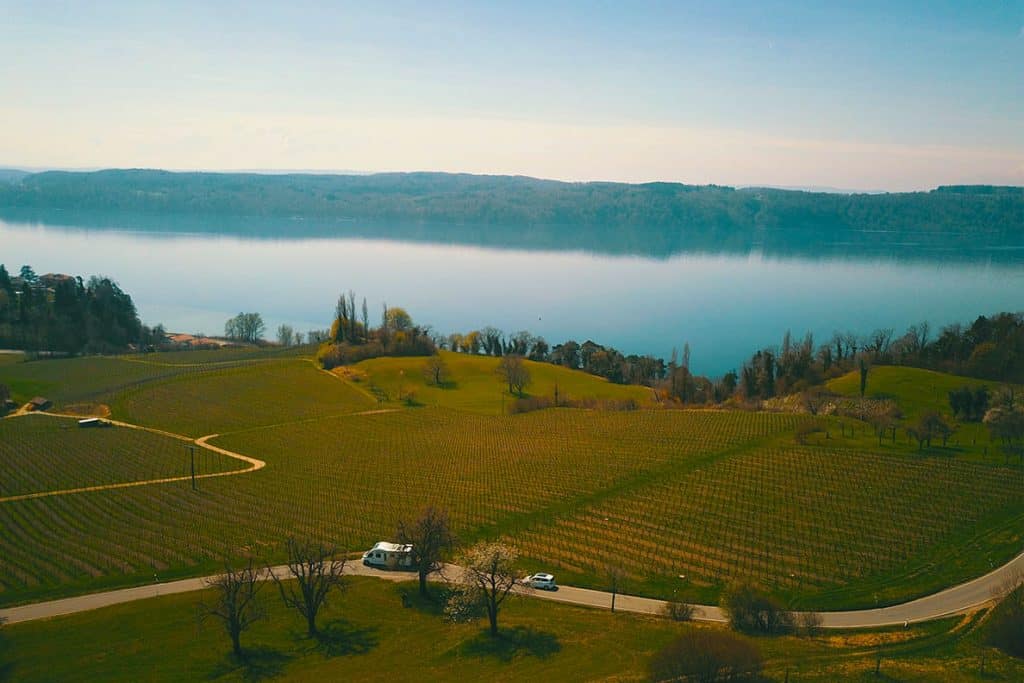
As always, we prefer to tour outside of peak season, so we love touring Germany in Spring or Autumn. The weather is generally sunny and warm and the days are still long enough to make the most of them. The mountains may still have snow- we went up Zugspitze (the highest mountain in Germany) in April and it was still covered in snow.
In winter, expect snow, rain and cold, so make sure you pack appropriately if you’re visiting then, including fitting winter or all-season tyres. Despite the dreariness, we also love motorhoming in Germany in December, so we can visit the incredible Christmas markets (Germany has some of the best and biggest Christmas markets in Europe!)
New to motorhome or camper travel in Europe? You might find these posts helpful:
See all our Europe motorhoming posts here
NEED GEAR? If you need any kit or essentials for motorhoming in Europe, here’s what we recommend and where to find it
Planning a driving route from UK to Germany
There are several ways to get from the UK to Germany. The first question to ask yourself when you’re planning a motorhome trip in Europe is are you happy to pay tolls, or do you want to take the slower but cheaper back roads?
Also, if you’re driving your own vehicle from the UK, you need to decide how to get there. This is one of the few times I believe the Eurotunnel is consistently best- because no matter where you’re coming from in the UK, Calais is pretty much on the way to Germany.
Having said that, if you prefer not to use the Eurotunnel (or can’t, if you have LPG propulsion), there are plenty of ferry options, including along the coast of France and also Harwich to the Netherlands (see more about motorhoming in Holland here.)
READ MORE: Ferry or Eurotunnel- which is best (and tips to save money)
Hiring a motorhome to tour Germany
If you don’t have your own vehicle, or don’t want to drive to Germany, there are plenty of hire companies who rent out motorhomes or campervans. Expect to pay around £700 to £1000 a week for a small vehicle and go up from there. Prices are much cheaper in winter than in high season.
Of course, if you’re hiring a motorhome, you’ll have other factors to consider. If you’re flying in, you’ll need to pick an airport near the area you want to explore. Then you’ll need to find a hire company with a base near there and plan how to get from the airport to the campervan.
If you’re driving and then hiring, make sure the hire company has somewhere secure to park your car whilst you’re off touring around Germany in your camper.
Want to rent a vehicle for your road trip?
These might help:
READ: 10 essential questions to ask before you rent a motorhome
Essential kit to carry when motorhoming or campervanning in Germany
In Germany, as with all countries in Europe, there are certain things you MUST carry with you in your motorhome or campervan.
Don’t forget, if you are motorhoming through France to get to Germany, you need all the kit required by France as well as the kit for Germany.
CHECKLIST– Don’t forget to grab your FREE motorhome travel checklist HERE
GEAR– And if you need any motorhome gear for touring Germany or Europe, here’s what we recommend.
Things you need to drive in Germany- safety gear
Unlike in the UK, there are some things you legally MUST carry in your vehicle when campervanning in Germany. These are:
- Hi-vis reflective jackets – one per person (These MUST be accessible without getting out of the vehicle- ie, don’t keep them in the garage unless you can reach them from inside!)
- Warning triangle
- Headlight beam converters– must be fitted before you drive in Europe.
- UK sticker attached to the back of vehicle or reg plates (and trailer if you have one)
- First aid kit – compulsory in France and Germany. Find out what we carry in our European first aid kit here
TOP TIP: Buy these essentials for driving in Germany BEFORE you get to the border- prices at Eurotunnel or on the ferry can be two or three times as much. Here’s what you need from Amazon, which is cheaper than Halfords or the high street.
Road trip accessories you MIGHT need for a motorhome holiday in Germany
The following kit are things you might need to carry in your car, motorhome, caravan or campervan, depending on when you are planning your road trip in Germany.
If you are travelling between 15 October and 15 April, you will need to have winter tyres and/ or snow chains fitted as conditions dictate.
- Snow chains/ winter tyres– check the rules and pay close attention to the DATES when the snow chain/ snow tyres rules come into force. If you’re not sure, read THIS
- Red/ white warning board sign – for bike racks or anything overhanging the end of the motorhome or campervan. These are not currently compulsory in Germany, but they ARE compulsory if you’re motorhoming in Spain and Italy. Get the more expensive aluminium one as the cheaper versions are not legal in Italy.
- Spare bulbs for all lights in the vehicle
- Torch
- Fire extinguisher
- Water and snacks- just in case you run into traffic or breakdown somewhere remote.
What documents do you need to drive in Germany?
If you’re motorhoming in Germany, you need to carry the following documents:
- Passport (or identity card)
- Driving licence (check it is in date!)
- Motorhome Insurance documents- check you are covered for driving in Europe
- Breakdown cover
- Vehicle V5 logbook (which must show your correct address)
- Vehicle must be legally taxed and MOT’d
- Trailer certification
- Green card (get from your vehicle insurer)
- International Driving Permit if required
- Personal travel insurance
Planning to take your motorhome to Europe?
GUIDE: Stop the overwhelm with our step-by-step guide. Contains eBook, checklists and more. Complete Europe Motorhome Travel Toolkit
CHECKLIST: Don’t forget to grab your FREE Europe motorhome travel checklist HERE
GEAR– If you need any motorhome gear for touring Europe, here’s what we recommend.
Do you need an international driving permit to drive in Germany?
Most UK citizens do not need an IDP to drive in Germany, as long as you have a card driving licence issued in the UK (in date, of course!)
You might need one if you have:
- a paper driving licence only
- a licence issued in Gibraltar, Guernsey, Jersey or the Isle of Man
(If you do need an IDP, here’s an in-depth guide on how to get an International Driving Permit and which one(s) you need from a UK post office.
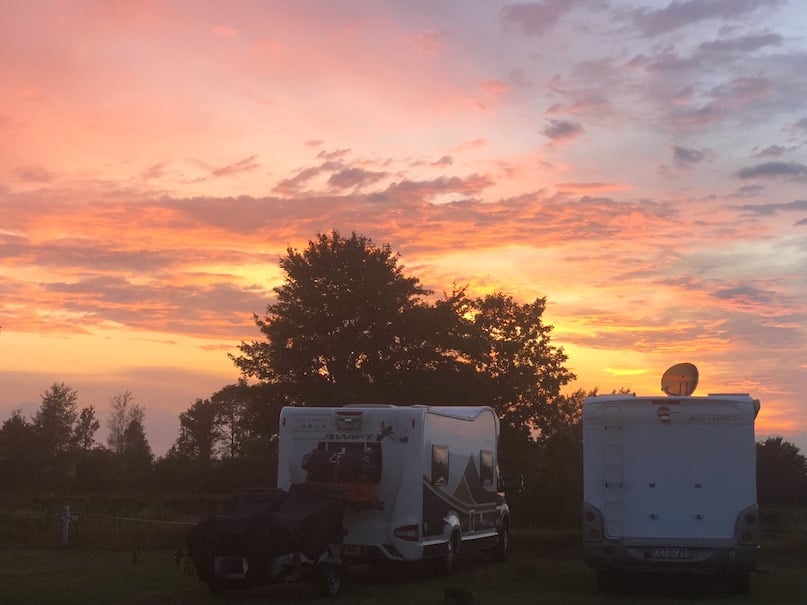
Motorhome touring in Germany- Other useful things you might need
We’ve been touring Europe in our motorhome for several years. We’ve tried all sorts of kit- some useful, some not so much.
Here is a list of things we highly recommend when motorhoming in Germany, but which are NOT essential:
- Motorhome WiFi– learn our favourite way to get internet on the road
- Toll pass (see below)
- TV- If you’d like TV in your motorhome or camper, here’s how to get it.
- Motorhome sat-nav– get one you can enter your motorhome dimensions into, like these
- Motorhome security camera– this thing is GOLD for allowing us to go exploring and leave the van for a short time.
- Solar panel- perfect if you want to wild camp in Germany with your motorhome
- Inverter- a motorhome wild camping essential
- An awesome motorhoming logbook to record and remember your adventures!
Motorhome stopovers & overnight parking in Germany
In Germany, there are several types of motorhome and campervan stopovers you can use.
- Campsites
- Stellplatz (the German name for ‘aires’)
- Autohof/ Free approved motorhome parking schemes
- Motorhome Wild camping
Motorhome Campsites in Germany
Campsites in Germany are much like campsites anywhere else in Europe. We’ve always been amazed at the standard of the campsites- the ones we’ve stayed at have been very well-equipped with great facilities. They also seem to have lovely restaurants either on-site or very close by. Of course, some campsites will be more rustic and have more basic facilities- choose wisely!
If you’re travelling out of high season and are planning to use campsites, we highly recommend buying an ACSI CampingCard membership to save money on your overnight camping.
Motorhome Aires in Germany- Stellplatz
An Aire is an approved motorhome and campervan overnight parking place- in Germany they’re called Stellplatz, but they work exactly the same way as motorhome aires in France. These places are found all over Germany and are approved places where you can stay with your motorhome or camper (not a caravan, sadly.)
They are often paid, although you will find some in more remote areas which are free to use overnight. Many of them have motorhome service points- often for a small additional fee.
READ MORE: Discover how we find and use Aires and overnight parking places when motorhoming in Europe
If you use a stellplatz there will usually be a board with the rules displayed, such as how much it costs, how to pay and how long you can stay for.
It’s always worth investing in a motorhome book of aires, as well as an online app- just in case you find yourself without internet in your motorhome (or without a wifi signal). Of course, the downside with any book is that it goes out of date, but don’t worry if it’s only a year or two out- most information about aires won’t change too much. These also make great gifts for motorhomers.
Other approved motorhome stopovers in Germany
Autohof
An alternative to stellplatz are Autohof, a private network of service stations. These places are situated near the Autobahn (they are NOT the Autobahn services- we don’t recommend staying on those) and they’re usually just a few minutes from an exit.
There is a fee for using an Autohof, but sometimes you can claim it back if you use the restaurant or shop on site.
If you’d like to avoid campsites and stellplatz, but don’t want to risk staying off-grid, there are two schemes which offer places to stay with a motorhome or campervan (and even a caravan!):
Landvergnügen
Landvergnügen (Country fun) is a German motorhome stopover scheme which runs very similarly to Brit Stops in the UK or France Passion.
It’s a collection of businesses and locations across Germany which allow motorhomes and campervans to stay overnight on their land. In return, you are expected to eat a meal at the restaurant, or buy some wine or produce from their shop. If you enjoy visiting vineyards, farms, restaurants or local markets, this might be a good scheme for you.
Winzeratlas
Winzeratlas is a very similar concept, but this one is entirely for wine lovers. All the places are winegrowers, winegrowers and taverns and they allow you to stay overnight after sampling their produce. To be fair, it’s a wonderful way to enjoy the evening without having to drive back to a hotel!
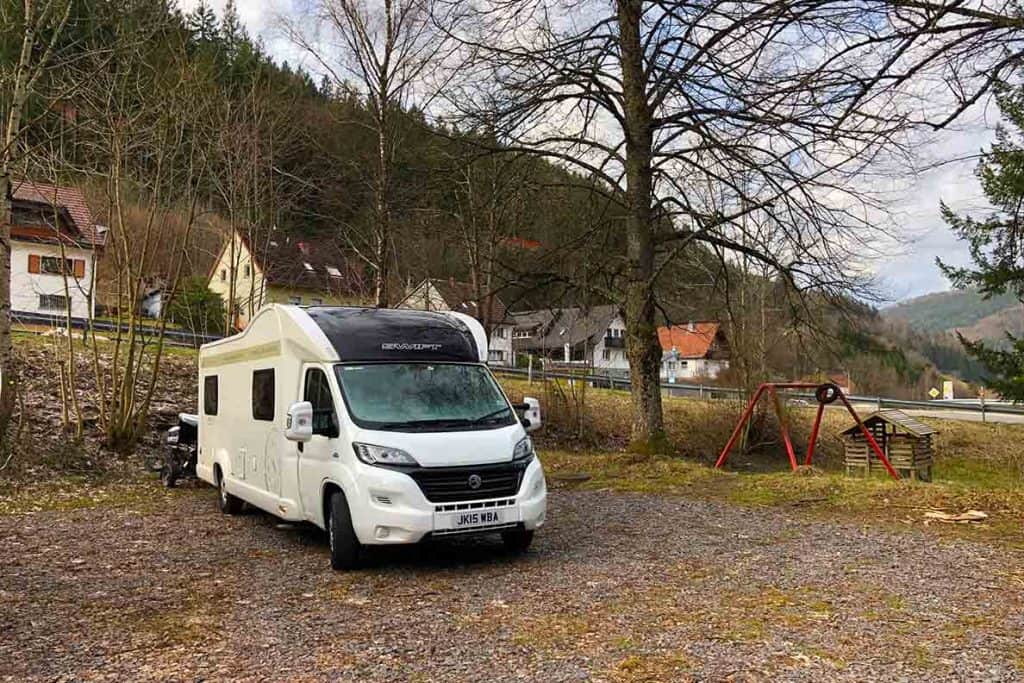
Wild camping in Germany for motorhomes and campers
Can you wild camp in Germany with a motorised vehicle?
Motorhome off-grid parking in Germany is permitted- with restrictions.
The restrictions are that you cannot do anything which looks like you are ‘camping’- so no outdoor furniture, washing lines outside and sometimes even using levelling chocks is frowned upon. We also recommend following common-sense guidelines- which you can find at the link below:
READ MORE: Learn how to wild camp with a motorhome here
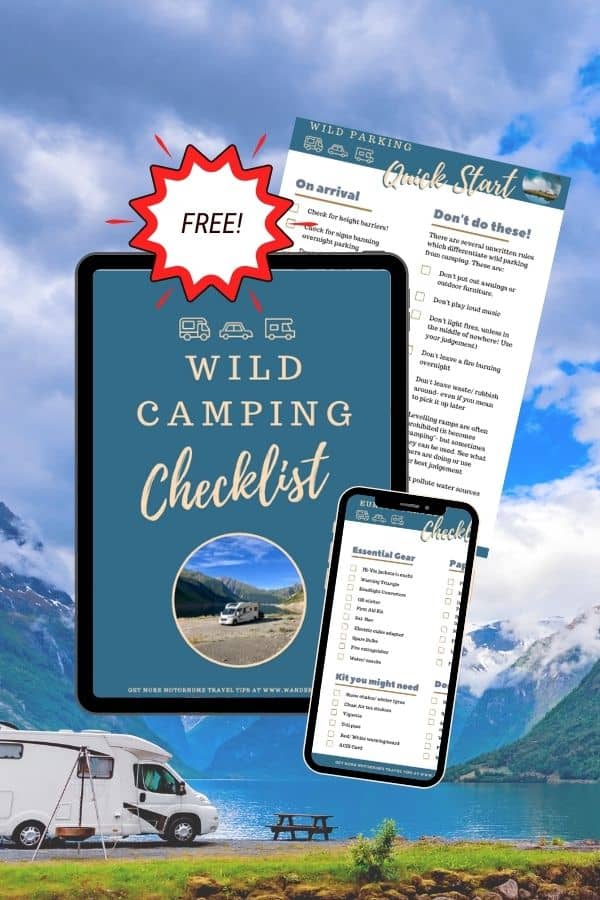
Want to stay off-grid with your motorhome?
Grab our FREE wild parking checklist and make it easy for yourself. Everything you need to do, bring or remember when you stay off-grid.
Motorhome and campervan service points in Germany
Motorhome Service points are areas where you can get fresh (often drinking) water, and empty your grey water tank and toilet cassette (black waste). They normally have a drive-over drain for grey waste, with a system off to one side.
Here, you’ll find black waste emptying and often two taps: one for taking on fresh water and one for rinsing your toilet cassette out- don’t get those confused! (We always recommend connecting and using your own hosepipe- just in case someone got it wrong before you!)
These aren’t just on campsites or Stellplatz- there are thousands of service points across Germany. You can find them using websites like campercontact.com or park4night.com.
NOTE: In winter, some water supplies may be turned off at times if the supply might freeze.
Driving tips for Germany
German drivers are mostly pretty confident and drive accurately and fast. If you’re used to motorhoming in Italy, it may be a welcome change! The roads are well maintained and roadworks are well-organised and planned.
- Germany drives on the right, so stay right and let them overtake on the left.
- Check your mirrors regularly- other drivers will usually indicate to show they are going to overtake.
- Do not undertake!
- All vehicles turning right must give priority to bikes (on their inside) going straight on.
- If you see hazard lights ahead, this means an accident or traffic jam. Slow right down and put on your hazard lights too, to alert the person behind you.
- A sign saying ‘Umleitung’ (or just ‘U’) mean diversion. ‘Geschlossen’ means closed
- ‘Ausfahrt’ (yes, I giggle very time) means exit. You’ll see this on every road exit. There will be a different speed limit for the slip road.
- Headlights – Germany has no law about using dipped headlights during daytime.
- Seatbelts are compulsory
- In-car speed camera detectors and motorhome sat-nav systems warning of the presence of radars are illegal (whether they’re in use or not!)
- Dash-cams are allowed, but must not obscure the driver’s vision and any footage used in videos must obscure faces and numberplates.
- Using or holding a mobile phone while the engine is on is illegal
- Minor traffic offences can result in on-the-spot fines.
- UK driving licences are perfectly acceptable to use and you probably won’t need an IDP (find out the changes made to driving in Europe after BREXIT)
- You will need a green card to prove you have motorhome insurance cover
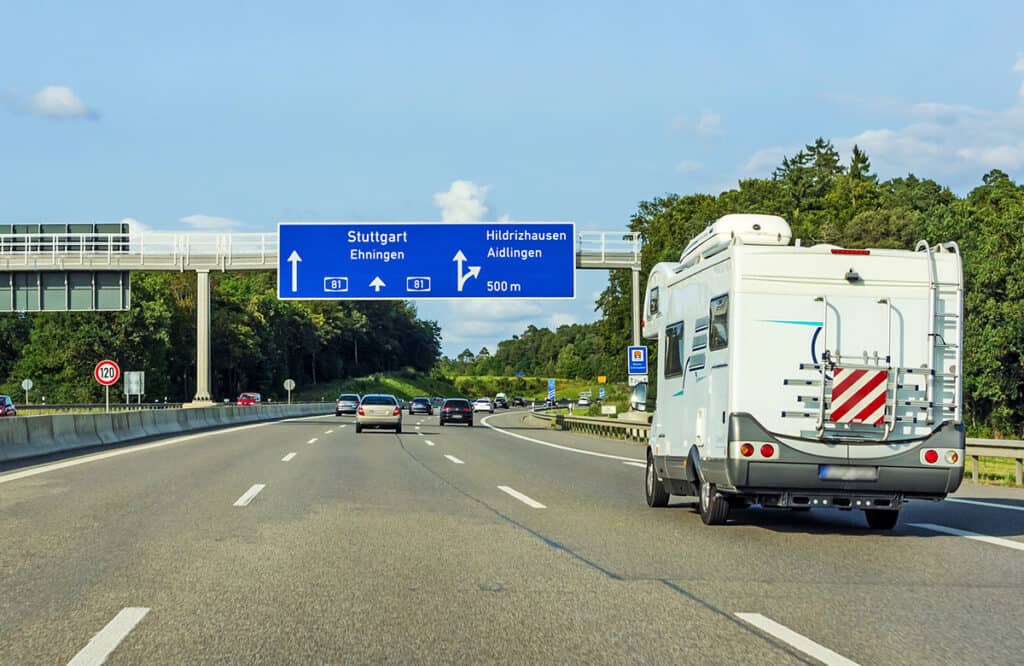
Autobahns
Autobahns are motorways and many don’t have speed limits. At all. You can go as fast as is safe. However, there are areas where speed limits are now enforced- you’ll see the speed signs on the side of the road and these must be obeyed- there will be cameras.
TOP TIP: If you find yourself with your pedal to the metal, trying to squeeze every drop of speed out of your van, you’re going to get more bangs, rattles and rolls than normals. Here’s how to stop the rattles in your camper!)
LEGAL SPEED SIGNS: A round white sign with red border and black numbers (such as ‘130’) means that is the legal speed limit and must be adhered to.
SUGGESTED TOP SPEED: square blue sign with white numbers reading ‘130’ means that’s the suggested top speed.
Also, be sure to leave extra braking room- they might not have speed limits but they take a very stern view on anyone causing an accident.
Speed limits in Germany
Speed Limits are as follows (unless otherwise signed!)
- Motorways/ autobahns- none unless indicated
- Major roads- 100 km/h (62 mph)
- Built up areas- 50 km/h (31 mph)
Speed cameras in Germany
Despite the lack of restriction on the Autobahns, there are PLENTY of speed cameras elsewhere.
Rest Stops
The autobahn has rest stops (Raststätten) with fuel stations, restaurants, shops, picnic tables and toilets (expect to pay an entrance fee!) There are also picnic areas along many roads, but these often have no facilities.
Drink driving laws
Germany has stricter drink driving laws than the UK, only allowing 0.5 milligrams of alcohol per millilitre of blood (the UK is 0.8). As always, don’t drink and drive.
Planning to take your motorhome to Europe?
GUIDE: Stop the overwhelm with our step-by-step guide. Contains eBook, checklists and more. Complete Europe Motorhome Travel Toolkit
CHECKLIST: Don’t forget to grab your FREE Europe motorhome travel checklist HERE
GEAR– If you need any motorhome gear for touring Europe, here’s what we recommend.
Low Emission Zones
Germany does have Umweltzonen (low emission zones) in some bigger cities. Here’s how to find more detailed information for low emission zones across Europe.
Sometimes, there’s no warning until you’re already in one! Luckily, they’re policed by wardens rather than cameras.
You can buy an umweltplakette (sticker) to put on the windscreen to drive into these in your motorhome from this site (currently it costs 6€ and takes about 2 weeks to arrive).
Toll Roads in Germany
You’ll be pleased to know that, for vehicles under 7.5 tonnes, there are no tolls or vignettes to pay in Germany, except for a couple of tunnels. However, they have been talking about adding tolls onto their most popular Autobahns for years, so I expect some to pop up in the future.
Don’t forget, both Austria and Switzerland require a vignette, so be sure to get one before/ as you cross the border. Also, if you’re touring Switzerland in a motorhome over 3.5 tons, you might need more than a vignette- be sure to check in advance.
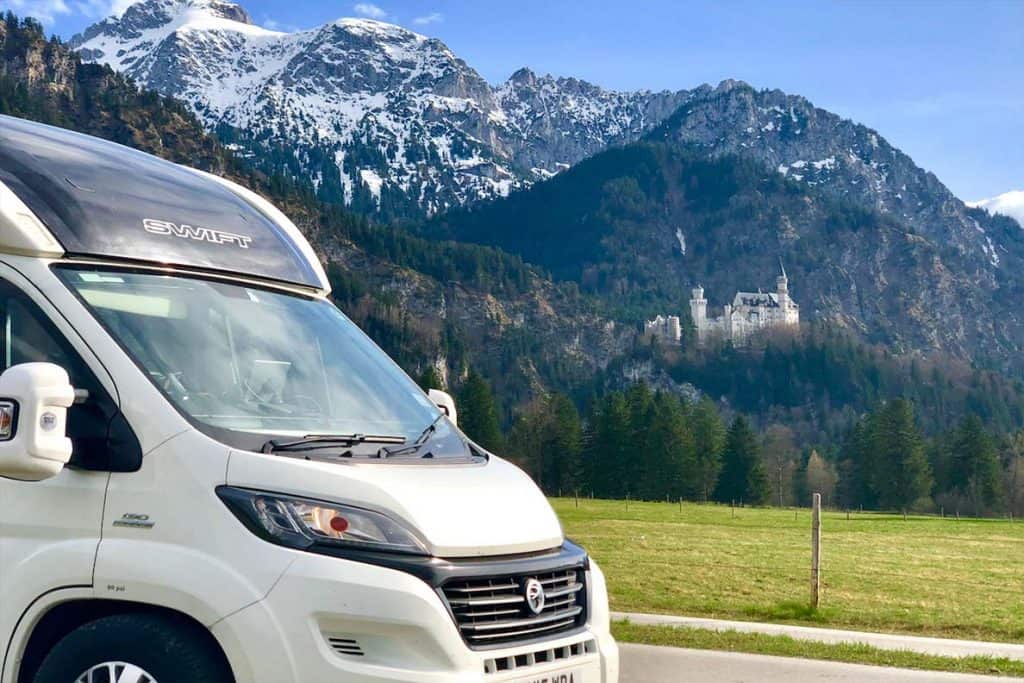
Driving in Germany- what to do in the event of a road traffic accident
You should have a European Claim Form provided by your insurer before you leave. In the event of an accident, all parties complete and sign the form at the scene and then send a copy to your insurer for assessment.
What to do at the scene:
- Stop your vehicle immediately but safely- out of the flow of traffic if possible.
- If a vehicle is blocking the road, use hazard lights and put the red warning triangle 30 metres from the scene to warn approaching traffic
- Exchange your details with the other involved parties. Be sure to get:
- Name and address of all the people involved in the accident
- Vehicle registration numbers of all parties
- Insurance company details of all parties
- Take photos of damage using a camera, GoPro or phone
For more details, read our step-by-step guide on dealing with a road traffic accident in Europe
“Rettungsgasse”
German (and Austrian) law requires drivers to create a Rettungsgasse (emergency vehicle lane) whenever there is an accident or emergency on the Autobahn. This is so ambulances, police or fire can get to the casualties.
NOTE: This is only for when you are pulling to a stop or very very slow moving.
If there are two lanes (going in the same direction), drivers must move their vehicles to the far right or far left (whichever is closest to you), creating a middle open lane for emergency vehicles. If there are more than two lanes then drivers in the right-side lanes stay far right, while drivers in the middle or left lane(s) go on the far left. The emergency parking lane (hard shoulder) should not be blocked unless signage or a police officer indicates otherwise.
You should keep all doors closed and avoid standing outside the vehicle so you don’t get in the way of any emergency service vehicles.
Petrol/ Diesel
There are plenty of fuel stations across Germany. As with everywhere, you’ll find the prices slightly higher on the Autobahns, although we found even those to be cheaper than in France or the UK.
Benzin is Petrol (gasoline). It’s often super (95) or Super plus (98) – Green handles on pump
Diesel is called… diesel. Black or yellow handles on pump
Some places are 24h pay at the pump, but may require you to go into the shop and pay the cashier either in advance or after you’ve filled up- there will be a sign to tell you what to do. (Leave your car in front of the pump and make a note of the pump number.)
You can pay using cash or a credit card. Many places do NOT take American Express. Non-autobahn stations in Germany may or may not accept card payment. You can usually use your UK cards without a problem.
Getting LPG in Germany
LPG (GPL) can be found at selected petrol stations and at autogas stations. If buying from a petrol station, you may need to wait for an attendant to turn the system on for you.
You can find places which sell LPG using MyLPG.eu
Remember, if you don’t have refillable gas bottles, you will be unable to buy a gas bottle which fits straight onto a UK system- you need a new pigtail.
Germany uses the ACME LPG adaptor for self-refillable gas bottles.
LEARN MORE: Learn how we find LPG in Europe for our motorhome
Motorhoming in Germany – Itinerary ideas and places to visit
If you’ve never been to Germany before, here’s the 10 day itinerary we did in the Black Forest and the Romantic road (south Germany)
- Start off in the Black Forest. Our first stop was Todtnau, where we rode the Hasenhorn Rodelbahn toboggan run (which was awesome!). There’s also a lovely walk at Todtnau waterfall
- Visit Triberg– the home of the world’s largest and smallest cuckoo blocks.
- Visit Hohenzollern Castle– the castle perched on the hill
- Head off down the Romantic road. There are too many highlights to count, including some of the best waterfalls in Europe, but you have to visit Neuschwanstein Castle– the one which inspired Walt Disney (be sure to go inside too- it’s breathtaking.)
If you like castles, here are the best castles in Southern Germany.
We also tied this trip in with a visit to the Rhine Falls in Switzerland, a trip around Lake Constance, wild camping for the night in Austria and we ended with a trip up Zugspitze- the highest mountain in Germany.
See all our Germany posts, trips and travel tips
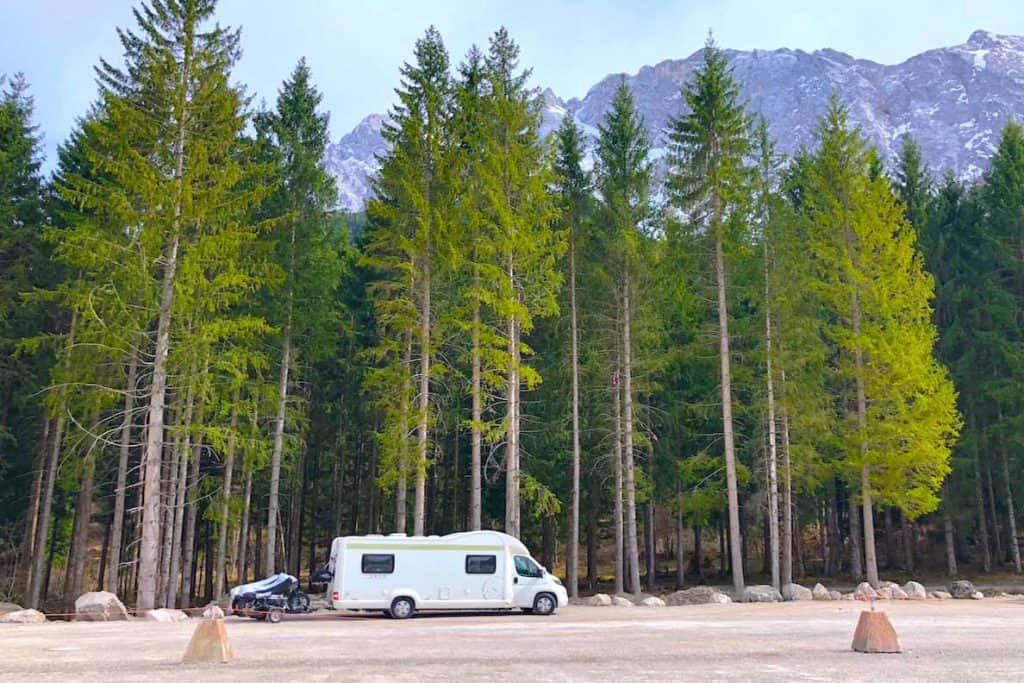
More useful things to know when motorhoming in Germany
Emergency Numbers: 112 will get you everything you need.
Language: German. English is widely understood and spoken.
Currency: Euro
Cards: most major credit and debit cards are accepted. American Express is only taken in large stores (not often at fuel stations)
Timezone: GMT+1 (or one hour ahead in BST) Germany is always one hour ahead of the UK, no matter what. Their clocks go forward and back whenever ours does.
Tipping– If you decide to treat yourself to a meal out and the service has been good, tipping 10-15% is standard. Coffee shops and lunchtime eateries often don’t include a tip, so check your bill before paying. Cash is best- the server rarely gets any tips added on by card.
Customs: There is no border between Germany and it’s EU neighbours, so you can carry as much alcohol and tobacco as you wish, as long as it’s for personal use. There are official border points on major roads into Switzerland, although we went the back roads and just drove right in!
Shops– Many shops, bars and restaurants close on Sundays. Bigger supermarkets may be open, but will close at lunchtime. If bakeries open on Sundays, they are often closed on Mondays instead. Many shops and businesses also shut for a long lunch (between 12-2pm) and some will not open on Wednesday afternoons.
Laundry: There are self-service launderettes in all major towns and cities, but many campsites have them as well. SB waschsalon is what you need to seach for in Google.
There are some localised laws in more rural areas- such as no vacuuming or washing on Sunday (day of rest) and no playing loud music during siesta time (12-3pm). Don’t worry, the Germans will tell you if you are breaking any rules.
Germans can sometimes come across as abrupt, but that’s a cultural thing- try not to take it personally. They are also EPIC at queuing and being on time- better than the British. Public transport is almost always to the minute- so don’t be late!
Don’t stand too close in queues or when talking to people- they value personal space.
Using the Nazi salute, saying or shouting “heil Hitler” and wearing or displaying the swastika or other symbols of the Third Reich is a criminal offence, punishable by up to five years in prison. They do not take ‘it was a joke’ as an acceptable reason.
The German’s do not shy away from their history, but they are keen not to make light of it. There are plenty of museums and historical reminders to the Holocaust, concentration camps and the wars, but they insist (rightly so) you treat these places with respect- no vandalism, sitting on them, and sometimes even taking ‘selfies’ is frowned upon.
Jaywalking (crossing the road without a crossing) is illegal in Germany and you may be fined.
Food and Drink in Germany
Bratwurst. That is all you need to know. It’s spicy pork sausage with bread and maybe a sauce (my husband loves the Currywurst). There are apparently over 1500 different varieties! Bratwurst mit pommes (sausage and chips) is served EVERYWHERE- even many service station restaurants.
They also love kebabs. There are over 16,000 kebab restaurants in Germany, and apparently they sell 30 döner kebabs a second!!!
For unique foods, you have to try Black Forest Gateau in the Black Forest (Triberg is famous for it). Also, try sauerkraut (pickled cabbage). It’s an… acquired taste but not as bad as it sounds!
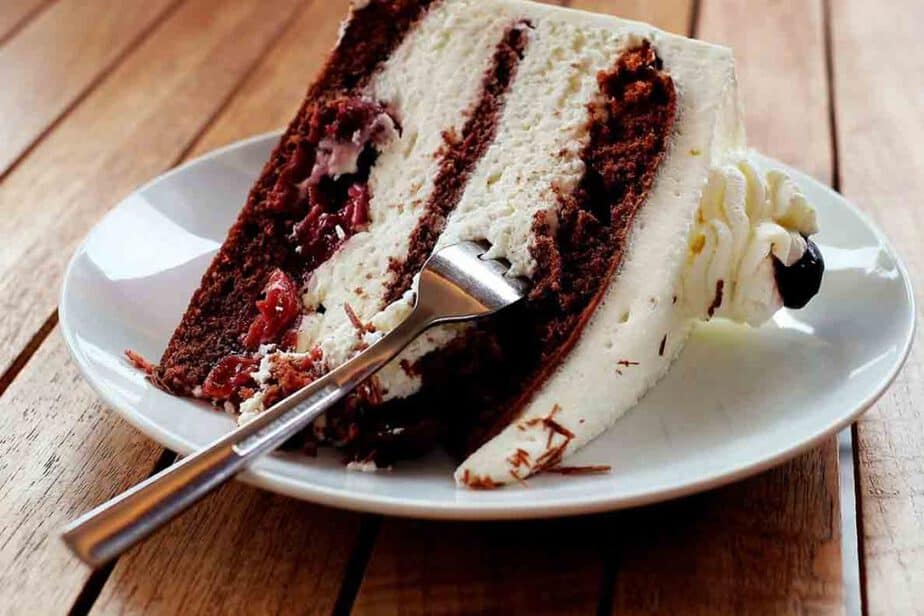
Germany is famous for its local beer and they take it very seriously! There are other options on the menu if you’re a non-beer drinker (like me.) Don’t ask for tap water- they consider that rude. Mineral water (still or sparkling) is always available by the bottle.
If you visit a beer festival and some the bigger beer halls, you will be charged a ‘pfand’ which is a deposit for the glass. Often, you keep one glass and they come around with huge jugs to refill your glass. They also love brandy and schnapps. You might also be charged a pfand at a supermarket if you buy bottles- you can take them back for a refund if you wish.
Germany is great for eating out- and priced very reasonably. We love the informality of the beer halls (mainly found in cities- Munich is our favourite so far), but I think only once have we had a ‘bad’ meal- Germans take their food seriously and bad places don’t last long.
Touring Germany with a dog
Germany is pretty dog-friendly and they are widely accepted on public transport. Take a muzzle and their pet paperwork, such as the AHC- although we’ve never been asked to show this.
Read more: changes affecting travelling to Europe with a dog after BREXIT
To return into the UK you’ll need a vet on the continent to administer a worming treatment and then allow between 24 hours and 5 days before re-entering the UK. We’ve done this in Germany with no issues.
You need to declare your pets when crossing from the UK to Europe (and back) and will pay an additional amount for them to travel.
Using a Drone in Germany
Drones and similar remote-controlled flying devices are allowed in Germany are long as you stay at least a minimum of 100m from people, vehicles and buildings that are not connected with the drone operator. Flying must happen in daylight only and up to a maximum height of 100m. Never fly closer than 1.5km to airports. The drone must always remain within the sight of the operator.
READ MORE: What’s the best travel drone (and how to choose)
If you have a drone above 2kg, you must have a qualification. All drones above 250g must be clearly labelled.
Please check for local regulations and military or other special restricted areas where all the aforementioned activities are forbidden by law. Here are the current rules.
Motorhoming in Germany Videos
Want to see videos about our road trips to Germany? Here you go- there are 8 videos in our Germany Road Trip playlist, including the toboggan run, Neuschwanstein, Hohenzollern Castle and more! You can click the 1/8 button on the top right to scroll through to whichever one you like.
We hope you found the video useful. If you did, we’d love it if you followed us on Youtube. New videos with tips for motorhoming and campervanning in the UK and Europe are released weekly.
So, did we inspire you to visit Germany? I do hope so!
I know there’s a lot of information in this post. If you’d like a version of it you can keep, plus loads more tips and tricks for touring in Europe and lots of other in-depth guides to countries, you can find it in e-Book format here or in printed format here.
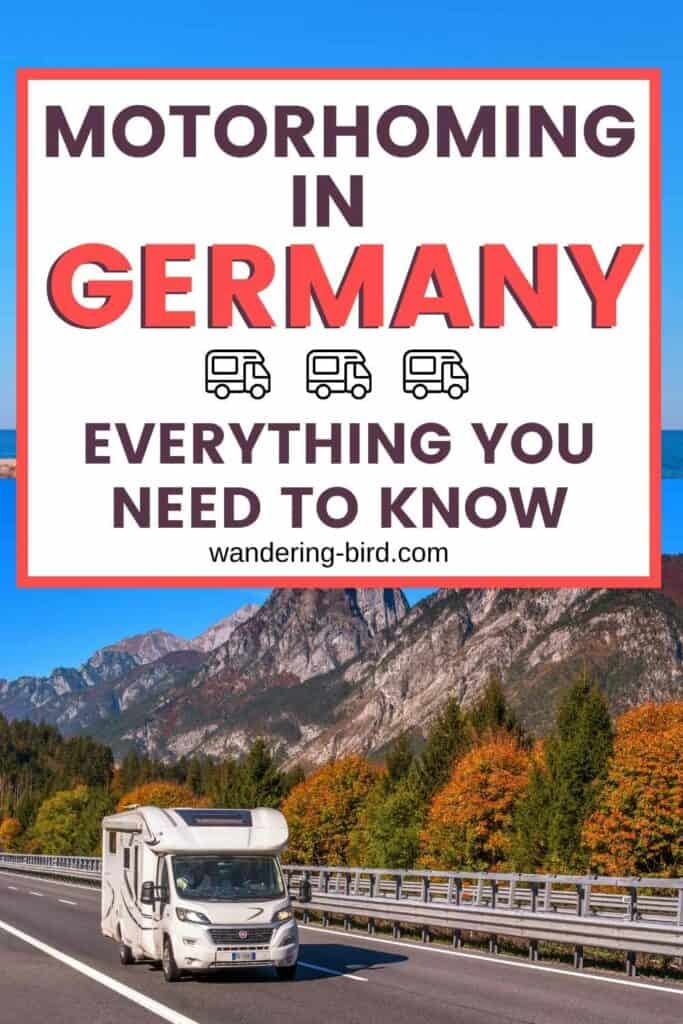
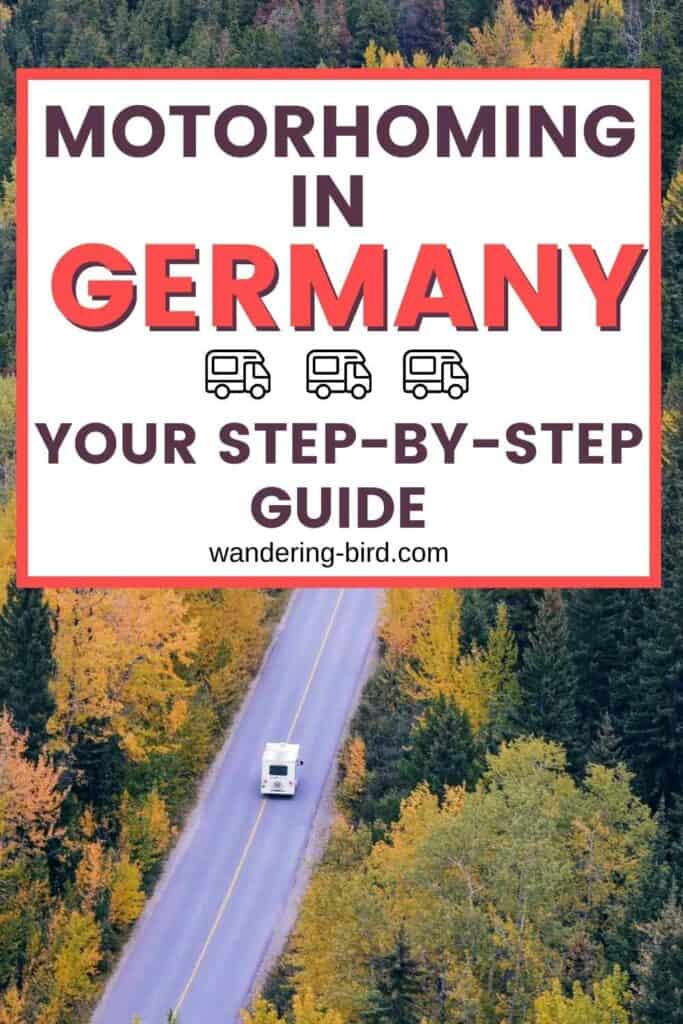

Kat never planned to buy a motorhome. She also never planned to quit her job as an air traffic controller, go touring around Europe in said motorhome, start one of the UK’s largest motorhome travel websites… or get a cocker spaniel.
Find out how she went from stuck in the rat race to being a digital nomad and inspiring thousands of people to have their own epic adventures here.
If you’d like to connect with Kat, send her an email or follow her adventures on social media.
Last update on 2024-05-07 / Affiliate links / Images from Amazon Product Advertising API
